Retreat
On May 29, the day after Memorial Day, I wrote in my journal, I need a retreat.
As I considered the statement, I realized I meant that I’m never free of cooking, checking this, cleaning that. Always my priority is something other than myself or my writing. Lately I’ve taken a few minutes once in a while to read in the middle of the day, but that’s not thinking or writing. Still, it’s a step– taking some time for myself
Here’s the irony: I have a spare house where writers, artists and others come to enjoy their own retreats from their busy-ness. Moreover, I write and give speeches about how to find time for writing in a busy life. I have known for years that taking– making– time in a busy schedule is essential to creativity. I don’t believe real creativity can occur under pressure. If one gets a creative idea in a busy office, I think the meditation that led to it has happened at an earlier time.
Yet recently I am filled with tension that surely hampers creativity.

Imagine
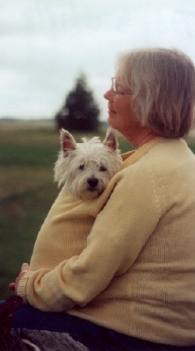 I recently read Jonah Lehrer’s Imagine: How Creativity Works and was struck by his statement that many insights happen in warm showers or when we’re dozing off because we’re relaxed. Our brains are being creative because they have nothing else to do. He also quoted studies that demonstrate that happy people perform better, and he thinks daydreaming should be part of the daily routine because that’s when insights happen.
I recently read Jonah Lehrer’s Imagine: How Creativity Works and was struck by his statement that many insights happen in warm showers or when we’re dozing off because we’re relaxed. Our brains are being creative because they have nothing else to do. He also quoted studies that demonstrate that happy people perform better, and he thinks daydreaming should be part of the daily routine because that’s when insights happen.
Daydream
When did I last daydream?
Probably in grade school when the teacher rapped on my desk and said, “Stop daydreaming!”
Is this why I am always doing something? Does always doing something actually block the creative thought that is so important to who I am? I read in bed, write in my journal, rush downstairs to answer emails and run upstairs to cook lunch, then gallop downstairs to finish that paragraph. I’m rarely without a book in my hand when I sit down, but I also usually have a pad and pencil so that if my reading sparks an idea, I can capture it.

Busyness
I’m always taking notes, not only in my handwritten personal journal, but in other ways– in my grocery list, in my garden guide, in my purse calendar and desk calendar and computer calendar, not to mention my computer journal. Does this busyness actually hamper thinking?
I start each day with coffee and my journal, where I record the time, temperature, my appointments for the day, and what I’ll make for lunch and dinner. I seldom simply sit still, letting the day wash over me.
Can creativity blossom while we “interact” on Facebook or chat on the phone or Twitter, however that’s done?
I doubt it.

Relaxation
Does creative relaxation need solitude?
I’m not sure. I can visualize a woman quilting with friends as they discuss an idea that blooms between them as they each contribute ideas. Each person’s creativity may be encouraged by that of the others to generate a new whole.
Yet instead of being constantly busy, suggests Lehrer in Imagine, we need to create time to deliberately relax in whatever mode works best for each of us. This creative relaxation may take many forms: sitting on the deck, lying in a hot bath, or listening to music through headphones while walking, but it is necessary. Perhaps quilting with friends qualifies.

Destruction
Why do I try to record everything? Because I once burned all the journals I’d kept until I was in my mid-twenties?
That act of destruction still takes my breath away when I remember it. And especially when I realize that I didn’t understand at the time I was hurting myself because my worthless husband at the time, who had cheated on our vows multiple times, had read my journals– because he thought I was unfaithful.

Encouragement
Certainly I don’t believe everything I write down is important.
Perhaps I am looking ahead, to believe that someday another writer will find encouragement in what I’ve done.
“She was cooking and cleaning and taking care of dogs and she still wrote poems and books, so I can do those things. She survived that and that, so I can thrive as well. ”

Robins
I sit under the deck with my journal watching the robins feeding the chirping babies; at least 3 heads show above the rim of the nest. Both male and female robins have red breasts, but the male’s is larger and redder, while the female’s looks washed out. I need to pay closer attention.
One or the other feeds the babies at 3:28, 3:37, 3:41, 3:47, 3:49, 3:55, 4:04, 4:05, and on and on.
The next morning when I peer down through the deck at the robin nest, it is empty. But when I walk toward the greenhouse, three baby robins suddenly squawk and flutter up over the concrete wall and into the grass.
The morning after that, two of them are sitting on the grass as an adult robin feeds them. A few days later, we still see adults feeding younger robins in various places around the house. They cheep incessantly while they wait to be fed: like teen-age humans.
At the tree swallow nest, two or maybe three indistinguishable swallows are zipping into the nest every few minutes, presumably also feeding chicks.
Meanwhile, two barn swallows perch on a deck support and chatter at one another. And blackbirds and sparrows zip back and forth across the yard, busy on their own errands. I’ve really noticed this lately: the birds are so busy hunting that they don’t bother to fly any higher than necessary. When we are in the yard, they zip past at waist or eye level, sometimes barely high enough to clear the ground. When I’m driving on the highway, I see they just clear the fences. They veer around obstacles with blinding speed, concentrating on getting where they are going.
Tonight, we watch several– it’s hard to tell how many– tree swallows flying high in the air, pirouetting, doing glissades, spinning, flying in formation– clearly just playing.

Survival
I try to ignore the destruction being done to the environment and to every shred of decency in this country by greedy thugs who are dismantling laws that have protected the air, water, and resources belonging to all of us. We seem to be living under a dictatorship rather than a democracy. If I read too much of the news, I become depressed, so I try to concentrate on what I can accomplish. Fortunately, we have no television set, so I’m sure I’m spared considerable ballyhoo.
Like the birds, I keep busy feeding my interests, zipping around obstacles. Their job is survival, as is mine. We do what we can while we have life.
Like the robins and tree swallows, I’ll keep on with what I am doing because the work I can do is all I can claim to accomplish.
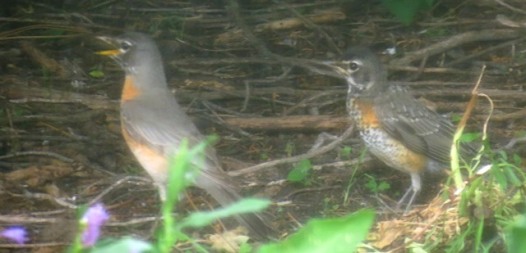
Lilacs
My dad planted lilacs every spring. He’d dig a few from where they thrived and take the shoots in front of the house to plant them where my mother could see them from the kitchen and living room. I can see him with a few branches in a bucket, carrying his shovel over his bony shoulder. He knew he wouldn’t live to see those lilacs bloom at their finest, but he planted them anyway.
Today, they grow in a massive row ten feet tall and four feet wide, and they are covered in bloom. Did he know that someday they would bloom like this, causing me to miss him so much? I can picture him with my mother strolling down the avenues of lilac bloom, reveling in the rich scent and color.
In the cemetery, the lilacs he planted on his parents’ graves have overwhelmed the stones, nearly hiding them. We have sometimes cut them back, but we can’t, or possibly we won’t, remove them. They mean too much, shedding their fragrance over the motley collection of memorials around them.

Cemetery
In the cemetery, bluebells are blooming in the buffalo grass and big bluestem. Sweet William is standing tall, almost ready to bloom. I see grape hyacinth three inches high on some graves, and budding roses on others.
Why do I take real flowers to the cemetery on Memorial Day every year? Every year I find peanut butter jars and olive oil jugs, weight them with rocks, and fill them with real flowers and the branches of flowering shrubs that grow around my parents’ house. I put these modest offerings on the graves of my husband, my father and mother, my grandmother and grandfather and the uncle I never knew, William Edward Callahan, my father’s half-brother, always called Eddie. His brother Archie, killed in a fall from a horse in our pastures, is buried beside his mother Ida and her second husband, Charles Hasselstrom.
All around us, graves are decorated lavishly with bright arrangements of artificial flowers. Some decorations consist of flowers in colors unknown to reality, but others are faithful reproductions of real, gorgeous blooms, backed by white Styrofoam crosses and wreaths. On some graves are small statues: the Virgin Mary, a horse, a tractor.
When I kneel over the grave of my father to place my offering, I can see his ironic smile when he made this trip every year. He’d walk to a particularly ostentatious stone of a once-powerful ranching family that had dwindled away into a few kids raised in town and say, “They used to BE somebody,” and walk away shaking his head.
Two days later I collect the wilted flowers and the containers and take them home to the garbage. The artificial flowers were still bright, though have already blown over in our ferocious winds. All summer, driving past the cemetery, I’ll glance up and see the flowers slowly disappearing as they disintegrate and are blown into the surrounding prairie.

Labor Day
Since burials began, people have probably left gifts at the graves of their loved ones. Sometimes the gifts were food, clothing, or weapons. Sometimes captured enemies were symbolically killed to mark a death, or a favorite dog or horse was slaughtered to join its master. Man doesn’t seem to want our loved ones to go into the darkness of death without comforts.
Since I am a member of the local Cemetery Board, I will drive to the cemetery the day after Labor Day, in early September. I will drive between the great stone gates, over the cattle guard and between the cannons.
Cannons. They guarded the grave of some Confederate prisoner in the Dry Tortugas, and through someone’s influence were brought proudly to this remote outpost in the West. Is there something ironic about these great weapons of war pointing at every visitor who comes to this cemetery?
With other members of the Cemetery Board, I will walk the cemetery collecting pieces of Styrofoam and torn flowers, putting all these symbolic gifts from the spring in black plastic bags to be piled into dumpsters and hauled away. People who care enough to decorate the graves for Memorial Day apparently find it inconvenient to take the offerings away before they become trash.
What do cannons in the cemetery mean?
Why do I take flowers to the cemetery every Memorial Day? Because my mother did.

Scraps
All I have left of my grandmother are a few photographs. She smiles love at me from above my computer every day.
All I have left that I can touch are a few fragile compositions in thread.
All I leave behind me will be scraps of paper threaded with words.
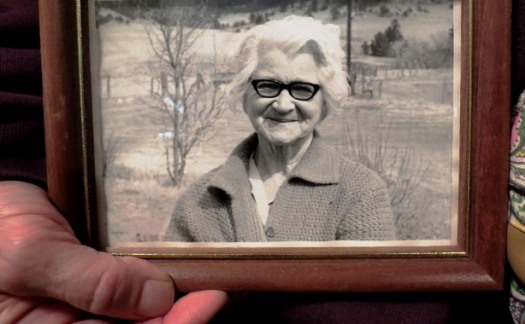
Graves
When we are finished with our lives, we sink into the ground, like the graves on the cemetery hill. Humans’ resting places are marked. The graves of the birds are anonymous. Yet they have just done their duty, done all they could.

Tombstones

I stop to read William Edward Callahan’s white marble tombstone, with his birth and death dates and the symbol of his military service cleanly carved into stone. 1895 to 1942. I’ve read his letters from Camp Funston where he was sent when he was improperly drafted at the age of 46. He wanted to come home to his horses.
My father always felt guilty that he wasn’t able to serve in the military; the rheumatic fever he had as a child left him with a withered arm. He wouldn’t have been good at taking orders.
Instead
When I think about a day when I haven’t gotten any writing done, I can list the things I’ve done that no one else will do, but that seem necessary for a well-ordered and pleasant home. I find it easier to do the jobs than to nag about getting them done. Take the hair out of the bathroom sink drain. Put the garbage in the can outside the basement door. Empty wastebaskets. Check the dogs’ water. Empty the humidifier. Clean the toilet and sinks. Spray the dogs with homemade tick repellent before they go outside. Close cupboard doors. Lock the doors at night. Put everything away.

Crocheting
In the corner of my bedroom hang several crochet hoops and picture frames containing “piecework” my grandmother crocheted during her life. These fragile cloths are all I was able to salvage after various relatives claimed her dishes, her silver, her watch. But these are most precious to me. She sat before her television set, watching events unfold while she created beauty with her arthritic hands. Sometimes she mistook the TV dramas for real life, but she kept on crocheting.
My hands now look a great deal like hers and I can’t crochet despite her efforts to teach me. But her example is still teaching me. I can do nothing better than to watch events unfold while stitching together my writing, my meditations on events. Perhaps my writing serves no more purpose than my grandmother’s crocheting did. Perhaps I do them only because I can, or in an effort to create beauty. But like the robins and the tree swallows, I’ll keep on with my work because it is mine.

Spirit
I’ve read somewhere, “land is not insensate; it is possessed of spirit.” Every inch of the earth is sacred, some believe. When I think of the land I sold to my neighbor, I feel fiercely protective. I want to get on a horse and ride over there to see that the antelope are still there, perhaps spot the cougar fleeing down that draw again, to see if anyone has disturbed the pile of rocks that I believe to be a grave.
I can’t do these things. I haven’t owned a horse in years, and dislike borrowing strange horses to ride. My neighbor would consider my visit to what is now his land an intrusion, though he wouldn’t say so, even if I met him in the pasture. He’d ask politely how I am doing, and how much rain we got, and we’d both observe how good the cows are looking.
Would he understand what I’m doing over there? Maybe. Probably.

Light
10:25 p.m. with full moon, slightly lopsided. I’m collapsed in a cool breeze after a hot bath. Chorus frogs sing on the dam below the house. Straight up are stars. I avoid looking to the north to the glow of Hermosa’s streetlights. To the west, the neighbors’ glaring yard lights announce their presence. Someone recently broke into several garages and houses under those lights when the families were away. No one would have known about their houses without the lights to guide them. But I don’t want to think those negative thoughts now. I look east and south into blessed darkness where I own enough land to keep lights away. At least for now.
A bird chirps as though half asleep. Maybe the robins under the deck sense my presence and are nervous. Cars speed past on the highway like blind beetles. Do their drivers have any idea what is out here?
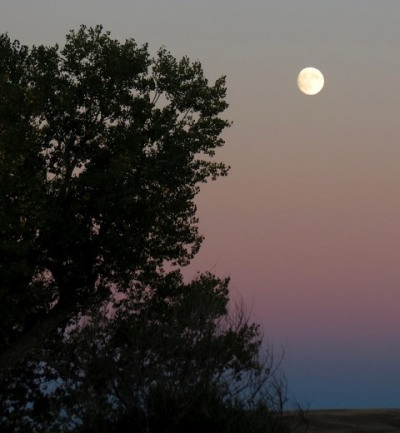
Sunrise
I go to the greenhouse to check the mouse traps, hoping to capture the rodents who have been eating the sage and thyme and basil that are just emerging from the pampered soil.
A baby rabbit is eating a cabbage leaf I threw off the deck yesterday. Since I closed down my compost bins because they were being raided by a skunk with no respect for our dogs, we haul some of our garbage to town. I throw from the deck anything the rabbits might eat. This contradicts the fact that I will hate it when baby rabbits start feasting on my radishes and tomatoes.

The Land
I’ve begun to loosen my hold on my father’s land, now mine.
I will soon be 75 years old, and have no siblings, no children. My cousins are all in other places and professions and my nieces and nephews uninterested in ranching. The land “over east” that I sold to my neighbor was about half of my ranch, so that I no longer have enough to make a living raising cattle. I sometimes dream about riding my horses there. But I won’t ride again, and certainly not over the prairie. There’s no horse I could trust, since there are no horses I raised myself. I know intimately the pastures over east—no doubt better than their current owners, who visit there in their mechanized vehicles. I’ve walked every step of the way to get there, tramped all over the pastures, ridden a horse or hiked into every niche in the prairie inside those fences. I’ve climbed most of the cliffs. I have sat in hidden alcoves that few people will ever see, sniffing the air of the prairie, watching the hawks soar above. So I tell myself that I am there, in every piece of ground where I’ve spent time.
I’m there, and I will always be there, in the pinnacle of rock where the previous inhabitants, the natives, watched for interlopers coming from the Badlands to the east. From that spire of rock, my spirit will float silently over the plains as long as air moves.
To me, the land is life. To anyone I can think of whom I might make my heir, it would be cash to be spent on a bigger house and newer car.
I remember my uncle Harold saying, “I didn’t work on this ranch my whole life for it to be somebody’s in-VEST-ment.” I had not imagined the non-metaphorical word “investment” could sound so much like the hiss of a dragon.

Burial
This morning we went to Belle Fourche to bury the ashes of my cousin Charlie. A few family members from Charlie’s generation gathered among the headstones of quartz and marble and concrete. Most of us were cousins, sons of my father’s sisters and brothers. Some friends of Charlie’s sister came, and the pastor of her church with his Bible. As our voices united in the Lord’s Prayer, we could hear the idling of an engine as the cemetery worker waited for us to leave so he could cover the hole. We left the urn under an oak tree and walked away. The next time we come here, we’ll see his name engraved on a flat stone beside that of his brother and his parents. At a nearby park, we ate a picnic lunch of fried chicken, potato salad, baked beans, and sweet desserts. I didn’t hear Charlie’s name mentioned.

We stopped in town on the way home and bought tomato plants. I was happily digging holes for them before I took a breath and tasted ice.
Clouds
When I looked up, I could see the ragged white edges of a hail cloud and smell the jagged ice that was falling north of us. I hustled the rest of my plants inside, and put buckets over the two I’d already planted. Jerry called from town to say that he was parked under a bridge watching the hail. I could hardly hear him for the pounding storm.
I settled in a chair on the deck to watch the drama and wait for the hail to reach me. At first the clouds were deep gray with frothy white tops that looked like foam or ripe cotton bolls. As the wind aloft caught them, some began to shred like snow blown across the highway in a blizzard. Clouds that were flat and black on the bottom bubbled into gray or blue on top. Blowing east and south, they piled up, losing their definition as they formed a solid gray wall beyond the green shield of the south ridge. Mordor!
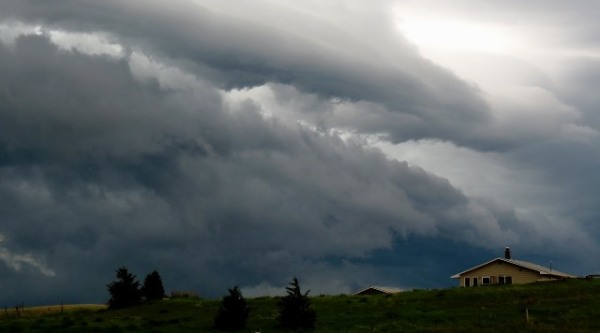
Nighthawks
Again and again the barn swallows flew above me, beating hard into the wind for a few seconds and then letting the wind take them, as if they were going down a slide. Then the nighthawks appeared, recognizable because they fly high and follow a pattern: flap-flap-flap-soar, flap-flap-flap-soar. While the barn swallows and tree swallows flirted with the wind, the nighthawks flew high, calling in their peculiar tone. The Lakota called them thunderbirds for their habit of flying in storms.

One nighthawk flew south, and began spiraling up and up and up until it disappeared behind a cloud. I thought of Charlie as I had last seen him, lying in a hospital bed with a tube in his arm. His suntanned, bony face looked so much like that of my father I could hardly stand to kiss him goodbye.

The nighthawks are invisible in the darkness now, calling high above me. Time to go inside. I breathe deeply.
++–++–++–++
I have not had a retreat in the ordinary sense. Yet in the middle of a busy life, I have made the time to write a line or a paragraph that became twenty-five brief meditations this week. Writing time doesn’t have to be long to be effective.
Linda M. Hasselstrom
Windbreak House Writing Retreats
Hermosa, South Dakota
© 2018, Linda M. Hasselstrom
# # #

Over the top! You are a woman at the height of your powers! Beautiful. Balanced. Centered.
Thank you, Gemma! I especially appreciate that comment coming from a journalist of your caliber, who understands balance.
I very much enjoyed reading all of this, so much to think about, expressed so well, as always, Linda. Thank you for sharing.
Thank you, Melissa; I hope this inspires your own writing and meditations, and I feel sure it will.
What motivation, as I listen to the patter splash of rain over filling culverts and likely dampening sills of open windows, to record my impressions of life. Most times I stay stuck in editing as I compose or thinking i’ll leave reminders of negativity or desperately searching for topics. When the bee in my bonnet, fly in the ointment, plug in the drain is to just START!
Absolutely. I, too, have to be careful not to edit all the time. There is a time for editing–but too much emphasis on it can kill spontaneity. Let yourself just scribble and know that when you finish, you can still grab an old towel and mop up those windowsills.
It’s Monday morning. My husband just left for work, still swollen from the swarm of some yellow jackets’ wrath who took umbrage when he stowed the ladder under the deck next to the semi-rotten wooden retaining wall. I pick up the twin food bowls from the kitchen floor and put them in the sink to soak off the dried Friskies Tasty Treasures, get my coffee and wander to the study. My Sierra Club desk calendar is wide open to this week, its pages ruffled on the bottom from when I spilled a whole cup of coffee, and I note that I do not have to go to physical therapy today because my new hip is working well and I’m walking well and I know how to do all the five main exercises myself. But will I? Then the computer screen comes to life and I check my email. I first go to junk mail because that’s way more interesting and there are always legitimate messages there. Back to the inbox and there are over 15 Daily Kos, Emily’s List, or Morning News messages, all asking for my signature. I open one and quickly delete it. Can this world get any worse? Then I see Linda’s post. Instantly I’m absorbed into many other worlds where there is order and meaning…. I’m transported to a tiny cemetery in Wisconsin where the grass is wet and thick and by the time I find my grandparents’ graves, my shoes are completely soaked through. I read all the meditations. Now I know how I will navigate my day: go to my poetry chair. Last summer my aged cat got up from his cardboard box in the kitchen and headed toward the deck door. He managed to walk down the three steps and onto the flagstone and then to the grass. He continued across the lawn to the very corner of the yard by the raspberry bushes under the huge pine trees.That is where he curled up. I went out and sat with him and then carried his weak and ravaged self back into the kitchen. Two more times he rallied to make his way there but stopped way short. When he died a few days later, that is where we buried him and that is where I put my green Adirondack chair which has a stunning view but is mostly hidden from view. i haven’t been out there once this summer but today i will go. Thank you, Linda.
Hello Darlene Mueller Morse,
Today I am thanking you. I wasn’t sure if the impression I wanted to convey with those short pieces would be coherent enough for a reader to follow, and you have gotten from it precisely what I wanted the reader to see: it’s time for you to write.
I’m struck by the number of topics you mention in one page:
those yellow-jackets
the two cats you still have
your new hip (I’m doing physical therapy for osteoarthritis, hoping to stave off having parts replaced!)
the exercises and why we have to talk ourselves into doing them
how email dominates our lives even when we don’t want it to
the state of the world
your grandparents’ graves and poetry—a poetry chair? I love the idea
your old cat and his dignified departure
Ah—your poetry chair—yes
Something else strikes me here. You mention the replaced hip. This suggests that you are not 20, with jobs and social obligations and distractions. This suggests that some of your time, at least, is your own so that you can, if you allow yourself to, say, “Today I am going to my poetry chair BEFORE I look at my email.”
I have had a day of errands during which all I could do was scribble a few notes in my journal for future reference. You have reminded me that I will be able to get back to writing. Thank you. Now—if it’s important to you—go thou and do likewise! I’d love to hear from you again.